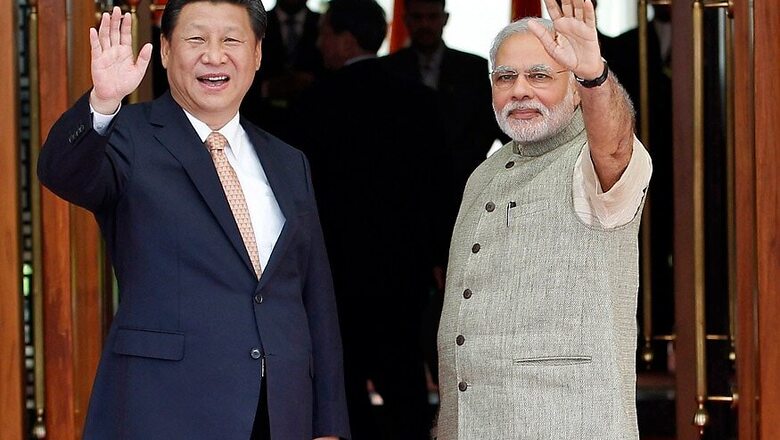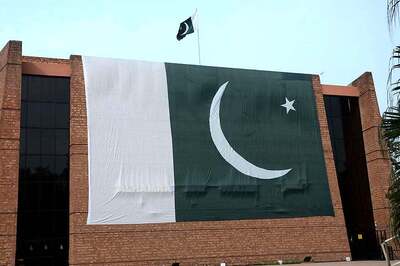
views
In 1956, India's first Prime Minister Jawaharlal Nehru met the American President Dwight Eisenhower, and in the meeting, he pressed for support for a UNSC seat for China. That was the level of trust between the two Asian neighbours, an example of how they looked out for each other.
Keeping this in mind, how China is currently using this veto power against Indian interests is indeed ironical.
India also diligently passed on the message from Zhou Enlai to the Americans that the Chinese were ready and will march to the Yalu river so the US doesn't push for the Korean war.
A lot has happened since then and it is just one decade of cooperation in an otherwise tense relationship in modern history. To make a limited point- both countries have cooperated in the past, so there is no reason to rule out cooperation on matters concerning security in the future.
How are we cooperating?
As far as making cooperation in fighting terror is considered
- In 2015, just last year India and China agreed upon 'a new security mechanism'.
- Under this, the home ministers will meet every two years and officials at Joint Secretary and Director General level will file an annual review.
- On paper, both countries have agreed to share information on terror networks and their linkages through a dedicated channel.
- India and China have also agreed to take coordinated positions on anti-terrorism at regional and multilateral levels.
Clearly, most of this is just on paper. China recently used its veto to save Jaish-e-Mohammed chief Maulana Masood Azhar at the UN. It is a fact that a plane, IC 814, was hijacked in 1999 to get him released from an Indian prison.
How to move forward
The following suggestions are based on meetings conducted with a range of security experts.
First, joint secretary and DG-level officials must meet every 3-4 months instead of once a year. The terror landscape is unfortunately evolving much faster than cooperation among those affected.
While the representatives of intelligence agencies are in touch with each other, there is a huge lack of trust.
How to build trust?
Cooperate in the Area of Mutual Interest: Fighting Islamic Global Jihad
Begin with Sharing Intel on ISIS. According to comments made in July by Wu Sike, China's special envoy to the Middle East, up to 100 Chinese citizens may be fighting for IS. Wu believes the Chinese fighters are Uighurs.
IS leader Abu Bakr Al-Baghdadi, has threatened both China and India saying, "Muslim rights are forcibly seized in China, India, Palestine," and that, "Your brothers all over the world are waiting for your rescue, and are anticipating your brigades." He has revealed his plans on occupying parts of Xinjiang over the next five years.
Indian agencies estimate about 40-45 Indians have travelled to ISIS-controlled areas.
One is plain and simple intelligence sharing on ISIS. But even more important is understanding the basic ideology it propagates, and how it is the same concept that drives several terror groups that we may consider local in nature. Like ETIM or LeT or TTP or JeM.
The purpose is the same - Sharia-ruled Islamic land; not plural, secular nation states.
ISIS is based in the Middle East. The battle here is for the heart of Islam, and once you are stronger in the Middle East, you will have more sway over Muslims scattered in other parts of the world, especially the continent. IS has already attracted a significant number of Muslim youth who see it as a successful model to bring about an Islamic revolution. It is important to note, there are ideological linkages among all Islamic terror groups, traceable physical links among most.
- Share intelligence on ISIS, ETIM, LeT and JeM. Advertise sharing of it on some, and understanding the sensitivities involved, keep cooperation on others quiet.
- Share intelligence to fight the Islamic Jihad concept in the cyber world.
Secondly, India and China have common concerns in Afghanistan. China's concern is that Afghan territory isn't used by the ETIM as a safe haven as it was in when Taliban called the shots. India's concern is that anti-India terrorists don't use Afghan territory as a safe haven as they did when Taliban was in power.
Now, China is in the group of four with Pakistan, US and Afghanistan in getting the Afghan Taliban to talk. Contrary to the popular belief that India is upset over China playing mediator, India actually is quite okay with China's role, if it leads to a safer Afghanistan.
The only caution - Afghan government should be in charge and not Pakistan as a proxy ruler. In order to ensure Afghanistan isn't used by ETIM, LeT, JeM , Haqqanis, Afghan government should call the shots in whatever settlement is arrived at.
India and China can share intelligence on Afghanistan. It is going to be extremely beneficial to China. Right now, China has put all its eggs in one basket, relying entirely on Pakistan. Getting blackmailed by Pakistan, hoping Pakistan's generals would rein in the Uighur terrorists based in FATA in compensation to organising talks between the Afghan government and the Afghan Taliban and by not supporting India on its legitimate fight against terror.
The sensitivities are understood in Delhi too, so cooperate behind closed doors. India could use China's connections with Pakistan and China could use India's goodwill in Afghanistan.
Once Afghanistan's former envoy to China told me, "Pakistanis tell us, don't share too much with the Chinese. They aren't your real friends, we are your brothers."
Thirdly, invite journalists, sociologists, government representatives to share the experience on how to deal with internal security concerns.
China it appears has an aggressive approach towards dealing with terrorism in Xinjiang. While India pursues inclusive norms in Kashmir and allows Kashmiris to retain their traditional values and identity by way of not allowing outsiders to buy properties in Kashmir, China has flooded Xinjiang with Han population which today accounts for 40 per cent of the total population of Xinjiang. An exchange between the civil society can help share notes on how to sensitively approach the matter.
Military exercises can more specifically look at counter terrorism cooperation.
Finally Cooperation Between Intelligence Officers on specific matters on the ground:
Crackdown on Uighurs, in Indian opinion, could lead to strong resistance to China abroad. China is aware of this and has been building its relations with countries abroad to ensure that Uighurs do not build a cohesive resistance forum against China. China cannot fight terrorism on its own and would need the help of other countries, including India. For instance, during the Bangkok blasts on a shrine frequented by the Chinese, one of the perpetrators of the crime escaped to the Middle East via Delhi. China recently held a meeting of ASEAN nations asking them to identify Uighur separatists and hand them over, especially countries with substantial Uighur population like Indonesia and Malaysia. India can also contribute towards identifying Uighur activists abroad and provide information regarding their activities.
• The Indian intelligence community feels the Chinese have a closed mindset when it comes to confiding in and cooperating with India because of the Tibetan issue. Indian intelligence community hopes that China instead appreciates Indi'’s efforts to restrain the Tibetans from undertaking aggressive anti-China activities.
• China has also been facilitating arms supply and support to Indian insurgent groups in Myanmar. 80 per cent of the arms in their possession are of Chinese make. Assuming that not all of it is genuinely supplied by the Chinese, but were bought from arms smugglers active along the Myanmar-China border, there is no doubt this arms supply channel is known to the Chinese and they are possibly turning a blind eye to it. India expects China to halt any such arms supplies and showcase their intention by way of detaining some cadres and also seizing some consignments.
Conclusion: Start slow, build trust, cooperate on the core issues by deciding on common principles.




















Comments
0 comment